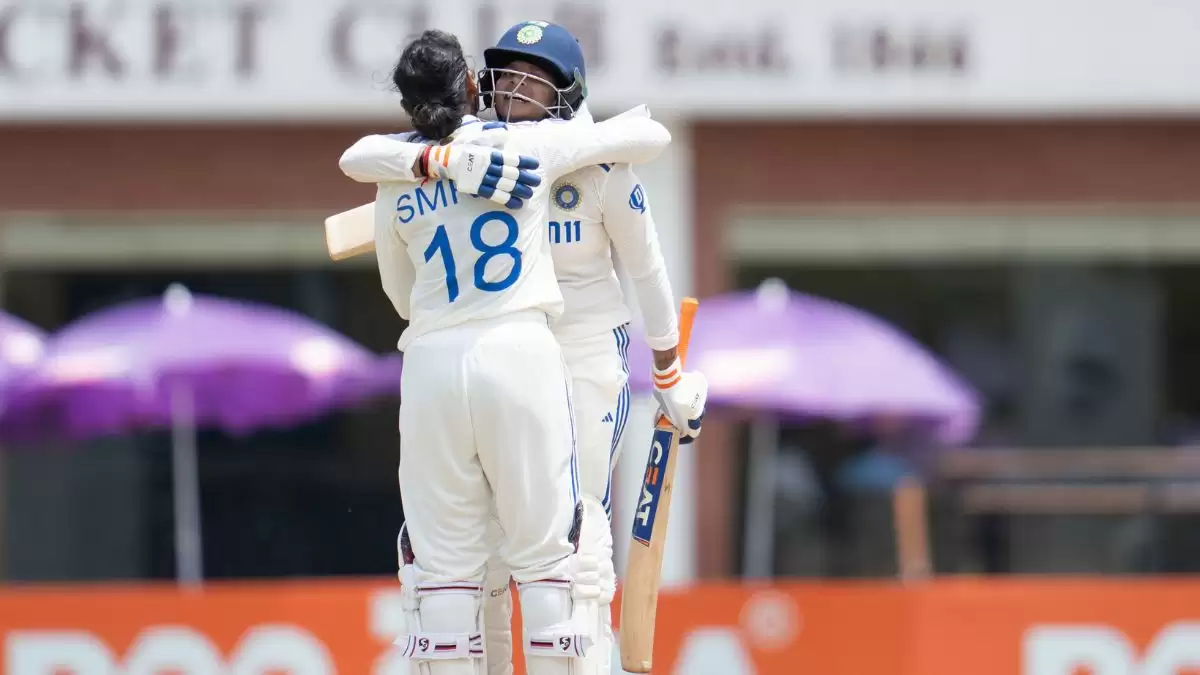
Earlier today, India openers Smriti Mandhana and Shafali Verma shattered records to register the highest-ever opening stand in the longest format in women's cricket.

Earlier today, during Day 1 of the ongoing one-off Test between India Women’s and South Africa Women’s, India opener Shafali Verma entered the record books for slamming the quickest-ever double ton.
In the process, she also became only the second Indian women’s cricketer after Mithali Raj to achieve a double ton in the long format.
During her knock of 205 runs from 197 balls, Shafali was complemented by other India opener Smriti Mandhana from the opposite end. The dynamic left-hander also registered an impressive knock of 149 off 161 balls as the pair forged a formidable opening partnership of 292 runs – the highest ever in women’s cricket.
In light of today’s incredible achievement, we will open the recordbooks and take a look at the top five opening partnerships in Women’s Test cricket.
Dynamic India openers Smriti Mandhana and Shafali Verma made history by achieving the highest-ever opening partnership in Women’s Test cricket.
Playing in the lone Test match against South Africa Women in Chennai, Mandhana and Verma each scored a century, amassing a remarkable 292-run partnership.
Mandhana was dismissed in the 51st over, falling just one run short of 150. Meanwhile, Verma set a new record with the fastest double century in Test history. Their impressive start propelled India to a total of 525 runs by the end of the first day.
Prior to Mandhana and Shafali’s record-breaking partnership today, Pakistan openers Sajjida Shah and Kiran Baluch held the apex position for two decades.
In a Test match between Pakistan and the West Indies back in 2004, the pair scripted history with the highest-ever opening partnership in Women’s Test cricket.
Sajjida Shah narrowly missed out on a century, falling just two runs short but their first-wicket partnership accumulated 241 runs. Kiran Baluch, however, achieved a double century, scoring 242 runs from 488 balls. Their impressive performance helped Pakistan reach 426/7 before declaring.
In a display of dominance against the Indian Women’s team, Caroline Atkins and Arran Brindle of England Women forged a historic partnership of 200 runs for the opening wicket during England’s sole Test match on their tour of India.
Opting to bat first, Atkins and Brindle took full advantage of the favourable conditions in Lucknow to establish this record-breaking stand. Their partnership, just shy of individual centuries, saw Atkins dismissed for 90 runs, while Brindle fell after scoring 85.
In 1991, Australia hosted India for a three-match Test series and asserted their dominance by winning all three games. The first Test featured a notable performance from Belinda Haggett and Belinda Clark, who shared a formidable 178-run opening partnership in the first innings.
Haggett contributed 73 runs before being dismissed by Sudha Shah, while Clark scored 104 runs before falling to Mithu Mukherjee. Despite India’s efforts, Australia posted 301/4 before declaring their innings.
Australia’s bowlers then restricted India to 217 runs before extending their lead with 111 more runs in their second innings, eventually declaring. In pursuit of a target of 195 runs for victory in the final innings, India reached 83/6 by the end of play on the last day, resulting in a draw.
Mandhana and Verma appear for a second time on the list. In June 2021, during a one-off Test against England, India’s first Test in seven years, Shafali Verma became one of the five new players to earn a debut.
The talented batter showed her mettle right away scoring 96 runs off 152 balls and contributed to a remarkable 167-run opening partnership with Smriti Mandhana in India’s first innings.
Despite a long hiatus from Test cricket, the Indian openers broke the previous record for the highest opening partnership for India in Tests, surpassing Gargi Banerjee and Sandhya Agarwal’s 153-run stand from 1984.
For more updates, follow CricXtasy on Facebook, Instagram, Twitter, Telegram and YouTube.